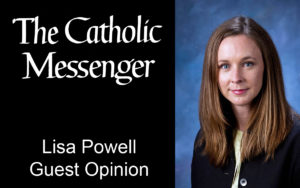By Lisa Powell
The first week of kindergarten my daughter informed me that a boy in her class said her favorite cartoon is “for babies.” I was crestfallen to learn that the policing of “coolness” begins by age 5 and that my daughter was already growing concerned about how her peers evaluate her.
 Of course she is simultaneously learning all about school assessments and standardized testing, and so it seems we can’t shield her anymore from a social system of perpetual performance evaluation, but I have hoped to protect her from a religious one. I want her to believe, at the very least, that she is acceptable as she is, both to God and her family. And so last week when she had a similar tale — that if a boy in her class knew her parents sang to her at bedtime, he’d call her a baby, I laid beside her recalling her baptism.
Of course she is simultaneously learning all about school assessments and standardized testing, and so it seems we can’t shield her anymore from a social system of perpetual performance evaluation, but I have hoped to protect her from a religious one. I want her to believe, at the very least, that she is acceptable as she is, both to God and her family. And so last week when she had a similar tale — that if a boy in her class knew her parents sang to her at bedtime, he’d call her a baby, I laid beside her recalling her baptism.
For me there is no greater sign of the sheer gratuity of God’s grace than an infant marked in the waters of baptism: an utterly dependent, vulnerable creature welcomed into the covenant community of God simply because they were brought to the font and God met them there. We annually celebrate our children’s baptism day because I want them to remember that they don’t have to perform to be welcomed by God, that before they strove to achieve something on a standardized test, before they tried to shape themselves into what their peers deemed “cool” and before they were asked the perpetual question of childhood: “What do you want to be when you grow up?” they were embraced by God.
Augustine loved infant baptism, too, apparently. It demonstrated to him that salvation is a gracious gift of God. Some even argue that his development of the idea of original sin was a consequence of his defense of infant baptism and not vice versa. Unfortunately, the strong tie to original sin overshadowed the sign and now most of my college students arrive only associating infant baptism with a washing away of original sin and not an offering of covenantal grace. Baptism isn’t only about forgiveness of sins (and thus all about our guilt and wrong doings) but about inclusion into God’s family likened to the Jewish rite of circumcision, given to babies at only 8 days old. You don’t do anything to be included. It’s not based upon your work. It is a sign of God going before us.
My students aren’t alone in this truncated view of baptism, of course. Christians altered the sign long ago; in the Americas this may be associated with the baptism of slaves. Laws in England suggested that one couldn’t enslave another Christian and so slaveholders in the colonies withheld Christian instruction and baptism from their slaves. This practice ran counter to the twisted theological justification for the institution of slavery in the colonies — to offer salvation to these people from Africa. And so by 1706 at least six colonial legislatures passed laws clarifying that baptism does not alter the social status of an enslaved individual. One missionary even required slaves at their baptisms to recite a statement declaring that they seek baptism only for their soul and not for freedom.
The sign of baptism became, for many white Christians, only a sign of forgiveness and not a true incorporation into the covenant community or into the common family of Christ. They determined that the marking with water did not outweigh the other signs marked on black bodies, those of ownership and domination, the deep scars of lashings, torment and brands, all carved into black flesh by another baptized “Christian.”
Yet many baptized slaves understood more and recognized in baptism an affirmation of their humanity and inherent worth — not as labor or property, but as children of God. This is well documented in part because pastors and slaveholders complained that once baptized, slaves became proud and more intractable; they entertained “too high an opinion of themselves.” The baptized slaves knew the sacrament meant more than just getting souls cleansed for an eventual heavenly reward. Baptism was a visible proclamation of their dignity.
In antiquity the church celebrated elaborate baptismal rites at Easter sunrise, demonstrating the baptized individual’s union with Christ in death and resurrection. Baptism was radical, countercultural and even dangerous during persecution; in that water you died to the old order of the world and you came out reborn into a new order.
I need this sign and I need the exhortation: “Remember your baptism” to counter the messages society perpetuates about human worth based on how much we own or produce. I need it to counter much of my Christian formation that paints God as always assessing my performance. It reminds us to leave the old measure behind, to accept that we are welcome, and in turn to embrace the humanity of all.
(Lisa Powell is a professor of theology and a Women and Gender Studies Affiliate at St. Ambrose University in Davenport.)












Dr. Powell, what a thoughtful reflection on baptism! I appreciate the connection to slavery, baptism, God’s love, and dignity. What a gift! With society being so hard and the pressures of life being quite heavy. To be reminded that God’s love for us is unconditional with no continuous assessment of our rights and wrongs is refreshing. Thank you!
why do works?